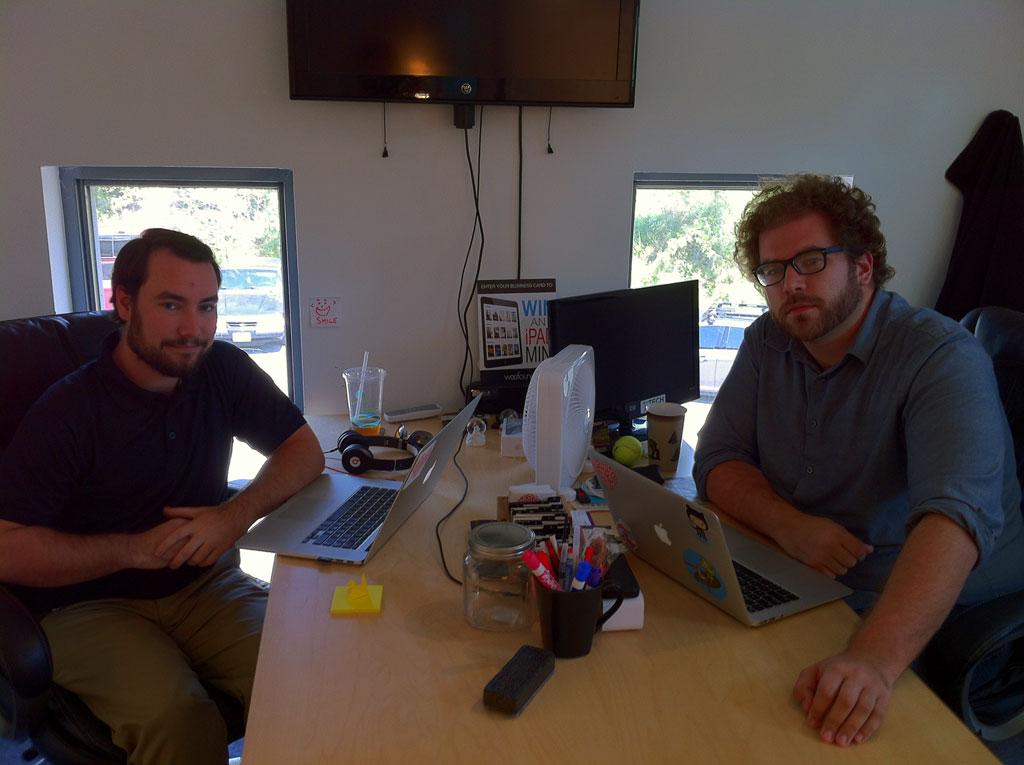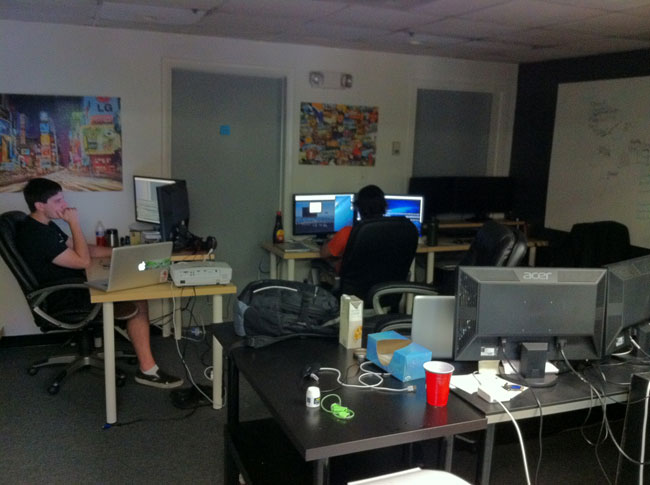Personality match-making service Woofound is choosing Baltimore city.
Cofounded by Dan Sines and Josh Spears in 2011, Woofound matches people to activities and careers using image-based personality tests administered via mobile phone. Since its early days, the startup has been located out of what looks like a glorified barn in Middle River in Baltimore County. But with its recent $200,000 investment from the Propel Baltimore Fund, Woofound must now move into Baltimore. It’s a condition of the funding, which is distributed by the Maryland Technology Development Corporation.
“We’re inches from closing on a space,” said Spears in an August interview. He hinted that Woofound’s new office for its 18 employees would be somewhere in or near Harbor East.
The new office space marks the high point in several months of rapid growth for a startup that was originally conceived as something else entirely: a social media company for businesses, making easy money off brand management and other boilerplate-business-buzzword services that companies without in-house social media teams outsource.
It wasn’t until Spears had trouble planning a blind date that they took their idea for social media in a whole new direction.
Sines and Spears were road-tripping back from Arizona in late 2010. The two had previously met at Parkville Middle School, but Spears had gone to Vanguard University in California while Sines stuck closer to his home of Middle River and attended the University of Maryland, Baltimore County (UMBC).
The idea for the image-based personality tests created by Woofound was based on one question, Spears said: “What exists to help people find personalized ways to interact with the world around them?”
In other words, for example, people can use something like Yelp and make it their onus to find a restaurant they like, which isn’t tedious. Sines and Spears, however, bet that people and businesses would use — and pay for — a system that gradually learned what they like and paired them with local activities amenable to their preferences automatically.
Several years later, Woofound is seemingly making good on that bet with their two apps, Explore and Compass, each of which has roughly 10,000 users on board.
There are close to 12,000 different things to do (restaurants to try, museums to visit, and the like) now included in Explore, a free iPhone app. The City of Baltimore and Baltimore County are paying for a version of Compass to match prospective employees to jobs in the public and private sectors through the state’s Workforce Exchange portal. The respective apps match users with activities to do or careers to pursue on the basis of 400 different character traits and attributes assembled by an in-house psychology department.
- Both tests use images presented on a slider and paired with buttons for selecting “Me” or “Not Me.” The images, selected by Woofound’s three psychologists, are given traits and preferences, and an algorithm run through Woofound’s tech gradually picks up on what users enjoy doing most.
- Over time, selections presented to users on the free Explore app become more precise to their likes and dislikes relative to the options available to them in their immediate location.
- On Compass, the test is more of a winnowing process, gradually narrowing choices down for users until they’re presented with a career that matches their personalities.
For the first time, Compass is being used nationwide on more than 10 college campuses, which have all paid to license a version of the Compass app to help students pick majors. Five universities from Maryland are using Compass this semester, including Sines’ alma mater, UMBC, and Towson University.
Woofound collects data about its users, which includes:
- Name
- E-mail and password for login
- Age
- Gender, but only for Compass users
Data regarding character traits translate to numbers on Woofound’s servers. In order to find out more about you, a hacker would first have to know to which character traits the back-end numbers correspond.
While Sines and Spears say the licensing fees for Compass aren’t public—at colleges, the fees are proportional to the number of full-time students enrolled—companies and universities do pay, and that revenue, in addition to the $4.2 million of equity financing and convertible notes the two have collected since launch, keep the lights on, staffers employed and the free Explore app running.
“We sell [Compass] saying this can be used for companies to figure out [corporate] culture,” said Spears.
In fact, Woofound uses Compass to determine whom to hire themselves, and has used it on all 18 of its employees, three of whom are women. The notion of “culture fit” is tricky for startups to navigate — in the tech world, it’s been shown to be a convenient excuse for excluding women from the workplace — but Sines says Woofound cuts through perception to get at the “DNA of who you are.”
Eventually, Sines and Spears plan to build a suite of Woofound apps “that create a larger personality profile” for its users, said Spears. This would include Woofound’s version of such apps as Yelp.
Until then, Sines said that Compass is the startup’s “bread and butter while we’re working on our larger vision.”
And it’s likely that Woofound’s own employees, while many live in or near Middle River, have used Explore on nights out in Baltimore city. Spears says, however, the impending move to Charm City is based on more than an app’s recommendation.
“We like the idea of contributing to the startup ecosystem and being closer to the energy,” he said.
Woofound took second place in the inaugural Pitch Across Maryland competition in 2012. Watch cofounder Dan Sines pitch the startup aboard the pitch bus:
Join the conversation!
Find news, events, jobs and people who share your interests on Technical.ly's open community Slack

Baltimore daily roundup: Medtech made in Baltimore; Sen. Sanders visits Morgan State; Humane Ai review debate

Baltimore daily roundup: The city's new esports lab; a conference in Wilmington; GBC reports $4B of economic activity

Baltimore daily roundup: Find your next coworking space; sea turtle legislation; Dali raided and sued



